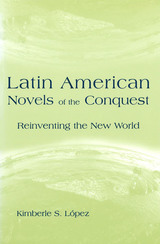2 books about Historical fiction, Spanish American

Latin American Novels of the Conquest
Reinventing the New World
Kimberle S. López
University of Missouri Press, 2002
As the quincentenary of Columbus’s first voyage was approaching, Latin American authors vied to finish novels rewriting the conquest in order to have them published in the years surrounding 1992. Surprisingly, few of these novels attempted to reconstruct the indigenous perspective on this historical moment, focusing instead on representing the European conquerors. In Latin American Novels of the Conquest, Kimberle López focuses on five of these works: Juan José Saer’s El entenado; Herminio Martínez’s Diario maldito de Nuño de Guzmán; Abel Posse’s El largo atardecer del caminante; and Homero Aridjis’s 1492: Vida y tiempos de Juan Cabezón de Castilla and Memorias del Nuevo Mundo. She utilizes these books to explore how their authors represented the conquest from the fictionalized perspective of the conquistador, ultimately deconstructing the rhetoric of empire through the representation of a simultaneous fascination and aversion between the colonizer and colonized.
The fictionalized explorers and conquistadors represented in this corpus all identify with certain aspects of Amerindian culture—significantly, those elements that are most distinct from European culture, such as cannibalism and human sacrifice—but also feel the need to distance themselves from these “others” in order to protect their own European cultural identity. In most cases, the conquistadors themselves are represented as outsiders within the enterprise of imperialism, due to ethnic, religious, or sexual differences from the norm. This representation turns the gaze inward toward the “other” within European culture, underscoring the complex origins of Latin American cultures in the violent encounter between the Amerindians and the conquistadors.
By examining these issues, Lopéz’s Latin American Novels of the Conquest illuminates the ways in which Latin American novelists used their literary imaginations to embody their ambivalence regarding their own transcultural heritage as children of both the colonized and the colonizer.
[more]

Pirate Novels
Fictions of Nation Building in Spanish America
Nina Gerassi-Navarro
Duke University Press, 1999
In Pirate Novels Nina Gerassi-Navarro examines an overlooked genre to reveal how history and fiction blend to address important isuses of nation building in nineteenth-century Spanish America. In the figure of the pirate, bold and heroic to some, cruel and criminal to others, she reveals an almost ideal character that came to embody the spirit of emerging nationhood and the violence associated with the struggle to attain it.
Beginning with an overview of the history of piracy, Gerassi-Navarro traces the historical icon of the pirate through colonial-era chronicles before exploring a group of nineteenth-century Mexican, Colombian, and Argentine novels. She argues that the authors of these novels, in their reconstructions of the past, were less interested in accurate representations than in using their narratives to discuss the future of their own countries. In reading these pirate narratives as metaphors for the process of nation building in Spanish America, Gerassi-Navarro exposes the conflicting strains of a complex culture attempting to shape that future. She shows how these pirate stories reflect the on-going debates that marked the consolidation of nationhood, as well as the extent to which the narratives of national identity in Spanish America are structured in relation to European cultures, and the ways in which questions of race and gender were addressed.
Providing new readings of the cultural and political paradigms that marked the literary production of nineteenth-century Spanish America, Pirate Novels uniquely expands the range of texts usually examined in the study of nation-building. It will interest literary scholars generally as well as those engaged in Latin American, colonial, and postcolonial studies.
Beginning with an overview of the history of piracy, Gerassi-Navarro traces the historical icon of the pirate through colonial-era chronicles before exploring a group of nineteenth-century Mexican, Colombian, and Argentine novels. She argues that the authors of these novels, in their reconstructions of the past, were less interested in accurate representations than in using their narratives to discuss the future of their own countries. In reading these pirate narratives as metaphors for the process of nation building in Spanish America, Gerassi-Navarro exposes the conflicting strains of a complex culture attempting to shape that future. She shows how these pirate stories reflect the on-going debates that marked the consolidation of nationhood, as well as the extent to which the narratives of national identity in Spanish America are structured in relation to European cultures, and the ways in which questions of race and gender were addressed.
Providing new readings of the cultural and political paradigms that marked the literary production of nineteenth-century Spanish America, Pirate Novels uniquely expands the range of texts usually examined in the study of nation-building. It will interest literary scholars generally as well as those engaged in Latin American, colonial, and postcolonial studies.
[more]
READERS
Browse our collection.
PUBLISHERS
See BiblioVault's publisher services.
STUDENT SERVICES
Files for college accessibility offices.
UChicago Accessibility Resources
home | accessibility | search | about | contact us
BiblioVault ® 2001 - 2024
The University of Chicago Press









